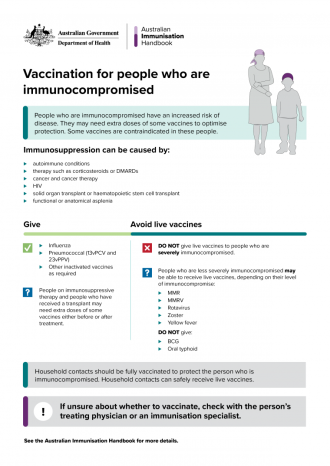Infographic. Vaccination for people who are immunocompromised

People who are immunocompromised have an increased risk of disease. They may need extra doses of some vaccines to optimise protection. Some vaccines are contraindicated in these people.
Immunosuppression can be caused by autoimmune conditions, therapy such as corticosteroids or DMARDs, cancer and cancer therapy, HIV, solid organ transplant or haematopoietic stem cell transplant, or functional or anatomical asplenia.
Give influenza, pneumococcal (13vPCV and 23vPPV) and other inactivated vaccines as required. People on immunosuppressive therapy and people who have received a transplant may need extra doses of some vaccines either before or after treatment.
Avoid live vaccines.
DO NOT give live vaccines to people who are severely immunocompromised. People who are less severely immunocompromised may be able to receive live vaccines, depending on their level of immunocompromise. These include MMR, MMRV, rotavirus, zoster and yellow fever. DO NOT give BCG or oral typhoid.
Household contacts should be fully vaccinated to protect the person who is immunocompromised. Household contacts can safely receive live vaccines.
If unsure about whether to vaccinate, check with the person’s treating physician or an immunisation specialist.
See the Australian Immunisation Handbook for more details.
Downloads
These files may not be suitable for users of assistive technology.

